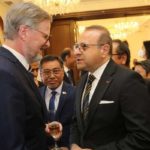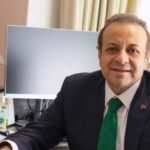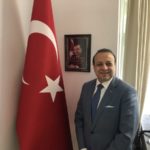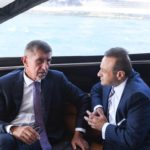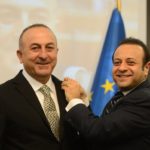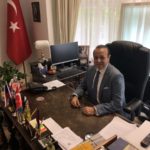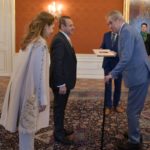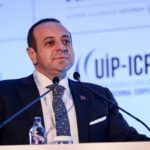- Hans Weber
- July 11, 2025
The Greeks are sinking migrant boats, says the Turkish ambassador. He described Ankara’s relations with Russia
In the Aegean Sea, the dispute between Turkey and Greece is escalating again, which, according to the Turkish ambassador in Prague, Egemen Bagis, takes place on several levels. Ankara accuses Athens, among other things, of a cruel attitude towards migrants. In an interview with CNN Prima NEWS, Bagis also talked about the country’s attitude towards Russia or Iran.
In recent weeks, we have been watching the growing tension between Turkey and Greece. What is at the heart of the whole dispute?
There are a number of interconnected disputes in the Aegean that need to be resolved between Turkey and Greece. The disputes are over the width of territorial waters and national airspace, the delimitation of the continental shelf, Greece’s violation of the demilitarized status of the eastern Aegean islands, as well as islands, islets and rocks whose sovereignty is not determined by valid international agreements, as well as service areas such as SAR (search and rescue service, editor’s note) , FIR (flight information area, editor’s note) or NAVTEX (service for delivery of navigational and meteorological warnings and forecasts, editor’s note) .
We prefer to solve these problems through bilateral negotiations. However, if they cannot be resolved in this way, we are also open to all mechanisms for the peaceful resolution of the dispute, which are enshrined in the UN Charter, including the International Court of Justice.
Greece, on the other hand, claims that the only problem between the two states is the delimitation of the continental shelf, which can only be resolved through the International Court of Justice. Greece denies that there are other problems. According to him, all other issues are Turkish unilateral claims to Greek sovereignty. However, denying the existence of certain problems does not mean that they simply disappear. Rather, it leads to an escalation of the dispute. We have always maintained a sincere and honest approach, but Greece does not show the same sincerity and honesty.
Greece was even supposed to fire on the Turkish coast guard. Is it true?
There were quite a few cases where Greece fired at fishermen or merchant ships. But what has been more worrying in recent years is their degrading and life-threatening attitude towards illegal migrants. Greece’s coercive actions, both on land and at sea, have turned into a systematic policy in which the rights of migrants are seriously violated. We are talking about the violation of practically all basic human rights – led by the right to life.
People are thrown into the sea handcuffed or left in the cold without the necessary clothing. We have seen many cases where the Greek Coast Guard has tried to drive migrants away by sinking or overturning their boats. Our National Coast Guard devotes most of its time and energy to rescuing migrants who have fallen victim to these violent attacks. Since 2020, we have saved 55,000 migrants in this way. Unfortunately, during this period we also came across dozens of dead migrants who died as a result of shooting, drowning or bad weather.
We keep repeating in international forums that Greece must comply with its international obligations and end forced displacements and collective expulsions. Currently, the European Union plays a big role. The new management of Frontex should avoid similar coercive actions. Migrants’ human rights, which are among the core values of the EU, should take precedence over border protection.
How do you think Athens should behave in solving common problems? What solution does Turkey propose?
Greece prefers to continue the blame game and confrontation over cooperation and good neighborly relations. The Greek authorities must abandon their policy of ongoing escalation and slandering Turkey, distorting the facts and complaining about us to third parties.
When the Greek side ends its hostile rhetoric, restores the demilitarized status of the islands, stops supporting terrorist organizations and seeks an honest and sincere dialogue with the Turkish minority, then we could consider a return to dialogue.
The last time we discussed the war in Ukraine together was in June. Where have Turkey’s diplomatic efforts and efforts to end the war gone since then?
Turkey’s approach has been clear and unchanging since the beginning of the war. We continue to support the independence, sovereignty and territorial integrity of Ukraine and provide strong political, humanitarian and technical support.
President Erdogan visited Lviv in August, which, in addition to his participation in the online summit of the Crimean Platform (a project of Ukraine’s partners that deals with the effects of the Russian occupation of Crimea, editor’s note), was a clear manifestation of our solidarity with Ukraine.
At the same time, we engage diplomatically on both sides with the aim of ending hostilities. Having a strategic partnership with Ukraine and a working relationship with Russia is beneficial to our efforts in this regard.
Thanks to this position, we were able to broker an agreement on the export of Ukrainian grain across the Black Sea. The Istanbul Agreement helped stabilize global food prices and continues to operate without significant disruption. From August 1 to September 25, 4.5 million tons of grain products reached world markets thanks to this. Our priority is to keep this agreement operational.
President Erdogan met the presidents of Iran and Russia in Tehran some time ago. How would you define the alliance of these three countries?
We have centuries-long relations with Iran. Although we have much in common, we also differ greatly on certain issues. But we have always preferred engagement over confrontation, such engagement should of course be balanced. Russia is an important player in our region that we cannot ignore. We have a multi-layered relationship and cooperate on a number of issues where our interests converge.
We are the westernmost part of the East and the easternmost part of the West. Turkey is the missing piece of the European puzzle.
However, our relations could hardly be described as an alliance. We diverge when looking at regional issues including Ukraine and Syria. Despite these challenges, however, we are trying to maintain a balanced and pragmatic relationship with Russia, which made the aforementioned grain export agreement possible.
The Astana process ( a series of summits aimed at resolving the civil war in Syria, editor’s note) was one of the most effective initiatives in the search for a solution to the ten-year-old crisis. It ensured relative de-escalation and stability and contributed directly to the political process. Thanks to the efforts of the Astana guarantors, a constitutional committee was established over the Damascus regime and the legitimate opposition. It is the only functioning mechanism that brings together all Syrian parties to reach a durable solution in line with UN Security Council Resolution 2254.
As you mentioned, the 7th Astana Summit was successfully held on July 19 in Tehran. The situation in the political process and the constitutional committee, the fight against terrorist organizations including DEASH and the PKK/YPG, the safe and voluntary returns of Syrians or the humanitarian aid mechanism were extensively discussed during the summit. As part of the UN General Assembly, a ministerial meeting was also held in Astana on September 21. We reiterated our determination to continue our relentless efforts to achieve a lasting solution.
Does Turkey now rely more on partners outside Europe?
In the current global context, rapid changes and transformations are taking place. As a result, we see the center of gravity of world politics shifting to new powerhouses such as Asia, Latin America and Africa. We have to adapt to this change.
Turkey believes that this can only be achieved through the further development of existing partnerships while creating new avenues for dialogue and cooperation. No one can afford the luxury of exclusion and being selective – current regional and global challenges require communication with all actors.
With this foresight, we have shifted our relationships with emerging powers and other actors. Our relations with these regions are not an alternative to our relations with the West. We consider them complementary.
Turkey’s goal of becoming a member of the European Union retains its strategic importance. We continue to maintain this commitment and pursue a constructive policy to improve cooperation and dialogue in all aspects. We rightly expect the EU to apply an equally fair policy towards Turkish membership.
As President Erdogan recently stated at the UN, Turkey is located both in the West and in the East. We are actually the westernmost part of the East and the easternmost part of the West. Turkey is the missing piece of the European puzzle.
Recent posts
See AllPrague Forum Membership
Join us
Be part of building bridges and channels to engage all the international key voices and decision makers living in the Czech Republic.
Become a member